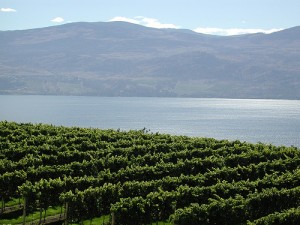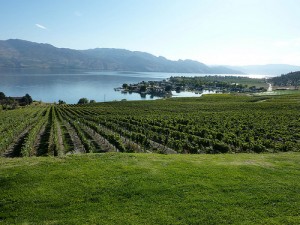Did you know that British Columbia is a growing wine region with hundreds of wineries?
Chances are you’re aware, but not familiar. Many wine enthusiasts are aware that a wine industry is developing in this Canadian province north of Washington State, and yet almost no one outside of British Columbia (BC) can access these wines, significantly impairing familiarity.
Within the province, as growth tempers itself against opportunity, a debate rages about the high cost of the wines, their accessibility to those living outside the province, and the future of the industry.
In this article, I will examine the reasons BC wines are expensive and difficult to find, and what the industry should consider doing in removing the barriers to access that currently make it impossible for non-residents to taste the wines, the delicious wines.
To understand where the BC wine industry is now we have to understand where it came from. This is best illustrated by looking at a recent controversy that made it to the pages of the international news magazine The Economist while also being covered by wine luminary Jancis Robinson.
The controversy begins with wines sold in Canada and labeled as “Cellared in Canada”. The government monopoly retailers were promoting and selling these wines as Ontario or British Columbia wines, despite being made with imported grape juice from places like Argentina.
This issue alone became a flashpoint when the official Olympic wine for Vancouver’s 2010 Winter Olympics was a “Cellared in Canada” wine. The controversy became heated to the extent that the producers of the Olympic wine were pressured into bottling a wine that is now made with 100% BC grown grapes.
This controversy has roots prior to the “free trade” era of Canadian wine, before the ratification of the NAFTA and GATT trade agreements, when it was common practice for local wine makers to blend internationally sourced fruit with Canadian fruit and a “splash” of water in order to sell the resulting wine as a British Columbia or Ontario product.
As the North American trade lanes opened up, a simultaneously occurring government sponsored vine replanting program resulted in widespread plantings of European vitis vinifera varieties (Merlot, Chardonnay, etc.). Winemakers who wanted to emphasize that they were making wines from 100% locally grown grapes developed an organization that would certify the authenticity of these wines. Known as the Vintners Quality Alliance (VQA), this organization guarantees the origin of Canadian wines. With the advent of the VQA and the planting program, BC wine producers started to focus on quality.
Yet, this was only the beginning of the story. Over the last two decades wineries have had to experiment (mostly at their own expense), in discovering how best to express the local “terroir”, or soil and climate conditions tied to geographical place, and to discover the best way for BC to find its wine identity.
As a young wine region it is still experimenting with varieties and styles. And, this experimentation is expensive. Unlike a region such as Bordeaux, BC wineries do not have hundreds of years of tradition to rely on and capital costs have not been borne by their ancestors.
Simply, BC has yet to find its parallel to Oregonian Pinot Noir or Napa Cabernet Sauvignon.
Another troubling growth challenge is land cost. Land in the Okanagan Valley (BC’s main wine region) is cost prohibitive with planted vineyards cost estimates at $150-$180k per acre. Comparatively, vineyards in South America or Australia can be as low as $5000 an acre, and even Sonoma County vineyards, with their beautifully sunny climate, old vines and established reputation, can be purchased for between $70k to $90k per acre. Next door in Washington state it is possible to buy vineyard land for $10k to $20k per acre. And, lest we forget, many of the wineries in Europe have been passed on from generation to generation within the same family, meaning the land was bought and paid for yearsago.
Climate and labor costs also drive up the costs of BC wines, with manual labor costing $15 an hour in BC, and cold climate conditions forcing the replanting of many vines damaged by frost.
This back story on BC wine culminates in the simple notion that if you are a non-resident of BC you might wonder why you can’t find BC wines anywhere. The reason is simple: Government regulation makes it nearly impossible for anyone outside of the province to find and taste the wines. At the end of prohibition, the Canadian federal government enacted the Importation of Intoxicating Liquors Act, which makes it illegal for BC wineries to ship their wines across provincial borders and sell them to consumers in other provinces. Instead, the government gave complete control of distribution to provincial monopolies.
This very difficult situation exists because of an outdated bureaucracy that is more interested in protecting itself and its views of how to build revenue than it is in growing a local industry, creating an efficient modern distribution and licensing network, and increasing the revenue poured back into government coffers. Without reform of this system, BC wines will continue to be nearly impossible to find.
Al Hudec of the BC law firm Farris, Vaughan, Wills, and Murphy LLP calls the current state of affairs, “an 80 year hangover from the end of prohibition” that hampers the growth of the industry.
Given the archaic laws governing the distribution and sale of wine in Canada, it is not surprising that British Columbia’s wines haven’t seen the light of day outside of the province. This is a huge shame, especially given the ever increasing quality of the wines, and the increasing interest of international wine media.
Consumers in Canada need to start speaking vocally about modernizing BC’s antiquated distribution and licensing system, and consumer’s abroad need to keep asking for BC wines. Please keep asking for BC wines.
Perhaps with the upcoming 2010 Olympics in Vancouver, the world will finally get the chance to taste some of BC’s exciting new wines and see just how much potential there is for great wine in the province. Maybe then, with local and international pressure, the wines of BC will make it out into the greater world, and BC will begin to find its place in the story of wine past, present and future.
Shea Coulson is a Vancouver, BC based lawyer who writes the wine blog justgrapeswine.com, a blog dedicated both to building the local industry and educating readers about the story of wine. Just Grapes Wine Blog’s mission is to foster niche communities of both newbies and wine enthusiasts by taking the ego out of the wine world, exploring new and exciting wines and regions, and promoting a passion for discovering one’s palate.


